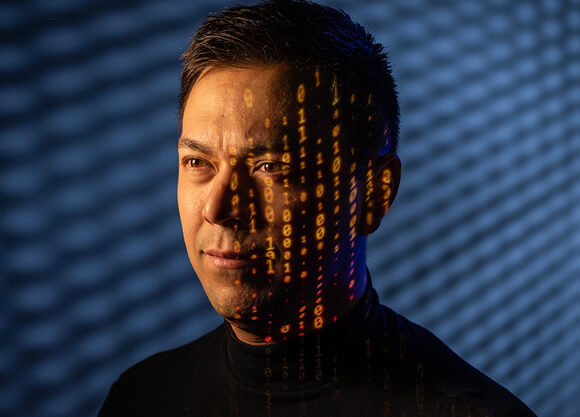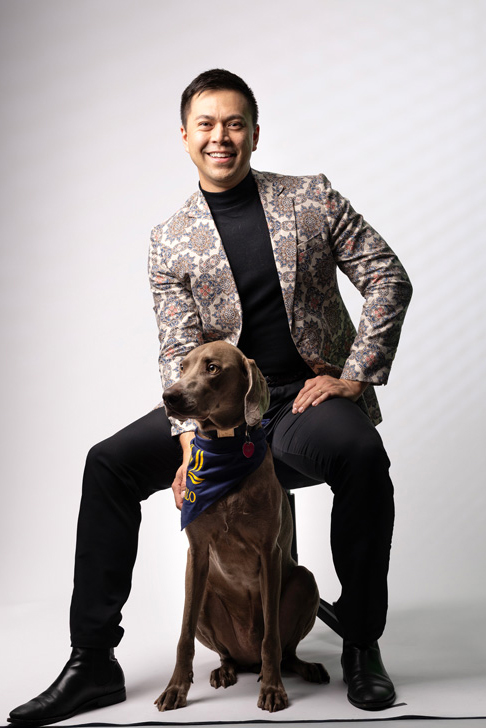
The Digital Reckoning: The Fight to Stop the Silent Surrender of Your Private Information
November 17, 2025

November 17, 2025

As his career unfolded from the buzz of Silicon Valley to the rush of launching a startup, Unger recalls seeing a disturbing reality taking shape: the unchecked mining of user data. Hidden online in cookies and click-to-accept policies was the silent, often unconscious surrender of our most sensitive information.
“In my early career, I observed the sheer amount of buying and selling of personal information happening daily. And not just basic info like names and addresses — there’s a lot more,” said Unger. “To me, it exposed worrisome behavior in an industry that wasn’t yet being addressed in our laws.”
Today, Unger combines his legal expertise and communication skills to advocate for reform in the digital space and mentor the next generation of lawyers to meet the ethical trials of a data-driven world. As a Quinnipiac associate professor of law and host of his own podcast, “Discourse,” he breaks down complex issues, from online privacy to constitutional shifts, helping others connect the dots often overlooked.
Because, he believes, understanding our rights shouldn’t require a law degree.
During his 20s and fresh out of college, Unger eagerly dove into Silicon Valley’s open exchange culture. His work began with managing multimillion-dollar transformation initiatives at Cisco Systems and quickly moved into the launch of two startups.
But beneath the bold “change the world” rhetoric of his peers, he saw troubling patterns: Profit often took precedence over privacy and equity. He realized that if he truly wanted to create the kind of change preached about in big tech circles, he’d have to leave them behind.
“You don’t notice it until you leave, but the irony in that world is unmatched,” he said. “Looking back, I want to shake people and say, ‘You’re not actually changing the world just because you say you are.’”
Data protection, he says, shouldn’t be exploited by boardrooms — it should be protected by law.
He quickly pivoted to a legal career with a focus on cyber, constitutional and business law, all areas that aligned with his tech experience and sense of responsibility.
After earning his Juris Doctor from Arizona State University’s Sandra Day O’Connor College of Law, Unger founded his own practice, The Unger Firm LLC, handling business, tech and cybersecurity matters.

Wayne Unger & Arlo
“The need for stronger privacy protections in this space is urgent, given the sensitivity and intimacy of the information collected. It’s a conversation we should have had decades ago,” said Unger. “But, in the back of my mind, I always thought about teaching. I believe if you really want to change the world, you should start with education.”
That belief ultimately led him to the classroom. As a Quinnipiac law professor, Unger reinforces lessons with stories and analogies and even shares his beloved dog, Arlo, who has become a law school celebrity among students. In a world of disconnected technology and rigid legal systems, he is using his voice and engaging spirit to restore something deeply human: connection, empathy and trust.
It’s a perspective he embraces as host of his podcast, “Discourse,” recently recognized as a Top-30 News Commentary on Apple Podcasts.
It’s also why he was honored with a School of Law Faculty Scholarship Award for his student-centered approach and groundbreaking work on the constitutional challenges posed by brain-computer interfaces.
As a legal scholar, Unger’s research dives into some of the most ethically troubled corners of technology, including neurotechnology and brain-computer interfaces from companies such as Neuralink and Synchron.
These devices, whether implanted or external, read brain signals revealing mood and personality traits and may even influence dream experiences.
As technology continues to evolve, Unger says lawyers are essential to guiding its ethical use. They help set limits on AI and emerging tools, solve problems through the courts, and ensure human judgment remains central when ethics and nuance are involved.
He is a leading voice in addressing these issues as the author of “Data Privacy & Security Law,” a casebook published by West Academic, and his scholarship has appeared in top law journals, including Columbia’s Science & Technology Law Review and the Washington & Lee Law Review. His public writing for The Conversation has been internationally syndicated, and he’s a frequent guest commentator for USA Today, Forbes, Newsweek, Reuters and NPR.
In a future shaped by data and algorithms, Unger sees the ability to break down complex issues into ethical, understandable terms as the foundation for reclaiming control over private information. After all, he’s seen firsthand that technology won’t wait for the laws to catch up.
“Neurotechnology is progressing so quickly that in 40 years, some form of mind reading may no longer be science fiction,” he said. “The need for privacy protection in this space is urgent. Laws need to be addressed now, before the technology is further developed. Before something as personal as our dreams can be bought and sold.”
Quinnipiac Today is your source for what's happening throughout #BobcatNation. Sign up for our weekly email newsletter to be among the first to know about news, events and members of our Bobcat family who are making a positive difference in our world.
Sign Up Now